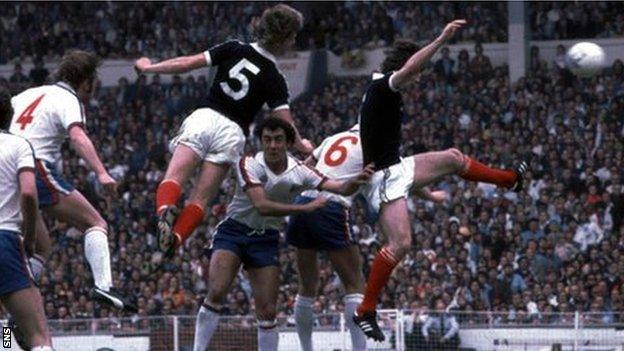Gordon McQueen: Daughter Hayley wants limit on heading after father's dementia diagnosis
- Published
'You don't go into football thinking you're going to get brain damage' - Hayley McQueen speaks to BBC Breakfast about dementia in football
Hayley McQueen says there should be a change in the football laws to limit heading after her father, former Scotland defender Gordon, was diagnosed with vascular dementia.
McQueen wants future generations of footballers to be better protected now the risks are more widely known.
"You don't go into football thinking you're going to get brain damage," she said.
"There are lots of footballers out there now thinking, 'is it me next?'"
McQueen, a sports journalist and broadcaster, told BBC Breakfast's Sally Nugent that her father has no regrets about his career because no-one knew of the potential risks.
The 68-year-old made almost 350 appearances for St Mirren, Leeds, Manchester United and Scotland between 1970 and 1985.

Gordon McQueen with his wife Yvonne and daughter Hayley
"I don't think I realised how much my dad used his head," said McQueen. "I didn't realise that it was over and over and over in training for years and years.
"You go back to childhood and heading a ball against a brick wall because if you didn't have anyone to play with, that's what you did.
"There have been moments when I said I can't believe that the thing that has given him so much love has so cruelly taken so much of him away from us.
"He scored some memorable headers. One of the pictures at home is him leaping into the air and scoring against England and he's very proud of that.
"But he says maybe he would have done things different in training if they were warned. You can't get angry about that; there is no-one to blame. They didn't know, but we know now and someone will be to blame if we don't do something about it."

Gordon McQueen scored five goals in 30 appearances for Scotland, including against England in 1977
Research commissioned by the Football Association and the Professional Footballers' Association (PFA) in 2019 found that former footballers are three and a half times more likely to die from degenerative brain diseases.
The study began after claims that former West Brom striker Jeff Astle died at the age of 59 because of repeated head trauma. Astle's family has been campaigning for more research into the issue.
In response to that study, heading has been banned during training for children aged 11 and under in England, Scotland and Northern Ireland.
"Cutting out heading in under-11s is a massive step forward, but what about in teen years when your brain is still developing?" McQueen said. "Football might change because of it - but so what? If it's saving people's lives and their futures then does it really matter?
"There needs to be changes in the law. Not just at under-11 level; it needs to be right through the professional game."
A parliamentary inquiry into the link between sport and long-term brain injury has been launched with Professor Willie Stewart, who led the 2019 research, among a number of experts due to appear before MPs on Tuesday.
The PFA has set up a taskforce to examine the issue of brain injury diseases in football. Some former players have also agreed to take part in studies looking into the impact of head injuries.
In a statement, the FA said it has helped to "lead the way in ground-breaking research into the links with football" and has "a clear and unwavering commitment, both financially and with resource, to support objective, robust and thorough research going forward".
It added: "Collaboration across football's governing bodies is key in order to better understand this important issue collectively, and we firmly believe that all areas of football should come together for this meaningful cause."

DeLorean: Back from the Future: How a fairytale went horribly wrong
Snowfall: A new drug hits the streets of LA and changes the game forever...
